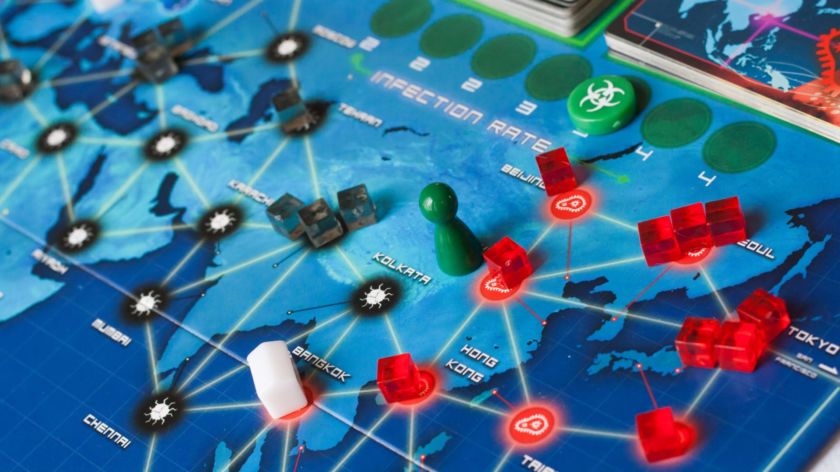‘Pandemic is designed with the possibility to win. We don’t have that certainty with corona’
-
 Photo: Derek Bruff
Photo: Derek Bruff
Pandemic Legacy is one of the most succesful board games of the twenty first century. Since the corona crisis started, the game has become more popular again. No wonder, says Health Economics scientist Henk Broekhuizen. The game has clear parallels with the corona crisis.
In Pandemic Legacy four diseases break out on different continents, every day more people get infected. The diseases spread at an alarming rate and the panic level of civilians rises. People start to riot and the government is considering drastic measures. If nothing happens fast, you’ll lose the game.
Of course, there’s a big difference between losing a game and losing actual human lives. Still, there are quite some parallels to be found between the board game Pandemic Legacy – the spin-off of the hit game Pandemic – and the corona crisis. Viruses in the game spread – just like the coronavirus – exponentially, you have to work together to come to a solution and you have to trust scientists and medics, because they know what they’re talking about.

Computer models
Health Economics scientist Henk Broekhuizen also recognised those similarities, he has played the game several times. As a scientist at Radboudumc, he develops computer models that are supposed to help policy makers with decisions about health care. The models use data to predict what will happen (for example with an infectious disease). The RIVM also uses those types of models to substantiate their advice about corona to the government.
Pandemic vs. Pandemic Legacy
Pandemic is a cooperative game, players have to work together to fight four diseases. A team of specialists travels the world to limit the outbreaks and develop vaccines. The game – which was released in 2008 – is now seen as a classic. The cooperative concept has had a big influence on the board game world.
Pandemic Legacy, a spin-off of the game, takes it a step further. Instead of playing one game, you play 12, each representing a month. What happens in the games, has an influence on the following ones. It contains more elements of surprise than the original game, because every ‘month’ you open up a box with cards that unlock new events and rules. Pandemic Legacy is number two on the general ranking of Board Game Geek, the most recognised forum for board game fans.
Exponential
‘The most obvious similarity between the game and the corona virus is that diseases spread exponentially. When playing the game, you think you’re doing well and then all of a sudden something goes wrong and you lose. Something small can cause it to get out of hand fast’, says Broekhuizen.
That’s why information is very important. Pandemic Legacy has some cards that let you predict where an outbreak will happen. ‘With information like that, you might be able to avoid further spreading of the virus.’ At the beginning of an outbreak, such knowledge is especially necessary, says Broekhuizen. Like with the corona virus: ‘You have to know who that one patient in Groningen is. If you stop that person, you’ll stop all the infected patients that come after.’
Working together
In Pandemic Legacy players work together to stop the spread of the viruses and to find vaccines. They play ‘against the game’. Working together is necessary to win, but also to survive COVID-19. ‘Everyone benefits from finding a vaccine,’ clarifies Broekhuizen.
Players fight the diseases with a team of experts, including medics, researchers and coordinating personnel. In Pandemic Legacy, experts are running the show. With corona, politicians are the ones that make the final decisions. Still, medics have a big influence. ‘Rutte said in one of his speeches that we have to trust the experts. He clearly relies on science.’
‘We could discover something next week that we never expected’
Matthew Leacock
The American game designer Matthew Leacock started designing Pandemic in 2004. At the time, the SARS virus was big in the news. ‘I’m sure that had an influence,’ he admits via Skype from California, where he lives. Still, he wants to make clear that it was never his goal for it to be realistic. ‘I wanted to create an engaging cooperative game, for people to exercise working together.’ He’d actually rather keep a ‘respectable distance’ from it being too topical or realistic: ‘I prefer it to be abstract’. Now that corona is dominating the world he’s seen an increase in popularity of the game. ‘People use games to make sense of what’s happening, to master it.’ Leacock mostly hopes the game will inspire people to work together more. Seeing how leaders are handling the crisis baffles and frustrates him. ‘It’d be great if people cooperated, communicated and collaborated like in the game. Because it’s not going to work any other way.’
To the question if Pandemic Legacy gives some insight into how viruses spread, Broekhuizen answers a definite ‘yes’. Still, the list of fictional and unrealistic components is too long to even mention. ‘The biggest difference is that in Pandemic, you know what you don’t know, we call that ‘known unknowns’.’ For example, you know that the diseases only spread to adjacent cities and what is necessary to find a cure. Pandemic Legacy actually does include more unknown factors, the boxes that unlock new rules, situations and events make the game less predictable. The corona virus takes the cake, though: ‘With corona we don’t know what we don’t know yet. We could discover something next week that we never expected.’
Model
In the real world, computer models can give some insight in what could happen and they can help – without any guarantees – making the right decisions for policy makers. The same models could actually help you win the Pandemic games, because the possibilities and components are known and clear. ‘The games were designed in such a way that they are possible to win. We don’t have that certainty with corona. That’s what makes it scary.’
The game has become more popular again during the corona crisis. Is it a good game to spend your quarantine-time with? Although Broekhuizen does really like it, he still thinks you shouldn’t: ‘You need several players to play, this is not the best moment to get together for a board game.’ Who doesn’t have enough housemates, can play Pandemic online.
For people who want to give Pandemic a realistic twist: apply the rules of this scenario to simulate the corona crisis.



